By Lance Jensen
The 1925 Serum Run was
an extraordinary and heroic effort by twenty mushers and their sled dog teams, working in
a relay system, to deliver diphtheria antitoxin to the disease-stricken town of Nome,
Alaska.
| The nationwide news coverage of the battle by men and
dogs against the elements and time led to subsequent nationwide tours by two of the
teams. After leaving for their respective tours in the
lower 48 states, the two famous lead dogs -- Balto and Togo -- never returned to the place
where both were born and raised -- the town that they had worked so hard to save. |
|
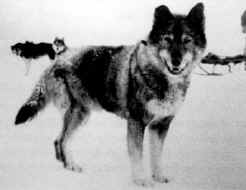
Togo, Seppala's famous lead dog
Photo from webmaster's collection |
Here are the stories of the first leg of the two
tours -- for Gunnar Kaasen and Leonhard Seppala -- and some details about the fates of
both mushers and their lead dogs.
KAASEN TOUR
Gunnar Kaasen and his dog team, led by Balto, was the
last team of the Serum Run relay in the race to Nome. They arrived on February 2,
1925, and delivered the antitoxin to Dr. Curtis Welch. Much of the news coverage of
this event was focused on the arrival of the life-saving serum. As a result, Balto
became an instant celebrity.
Not long after the Serum Run, Sol Lesser sent a
telegram to Gunnar Kaasen offering him a movie deal. Sol Lesser was an early pioneer
in the motion picture industry. In 1921, he had formed his own production company,
the Principal Pictures Corporation.
One of the provisions of the offer was that Kaasen had
to bring all of the dogs he had used in the Serum Run to the location where the movie was
to be filmed. In the event he was unable to do so, then the deal was off. The
movie was scheduled to be filmed at Mt. Rainier National Park in Washington State.
Gunnar Kaasen and his sled dog team arrived at Seattle,
Washington, on March 21, 1925 aboard the Alaska Steamship Company vessel, Alameda.
After receiving a hero's welcome from the citizens of Seattle, Kaasen and the dogs set off
for Mt. Rainier National Park. The park's superintendent had granted a special use
permit to Principal Pictures for the filming of the movie during the period March 20 - 28,
1925.
The movie was filmed at the Paradise Valley area of the
park and was titled "Balto's Race to Nome." The movie purported to be a
reenactment of the Serum Run and was later released to nationwide audiences.
AFTER THE KAASEN TOUR
In December of 1926, Gunnar Kaasen parted company with
the nine remaining dogs of his tour team in Chicago, Illinois. The dogs were
subsequently sold to a person with a history of animal abuse. The names and fates of two
of these dogs are unknown. Seven dogs survived the ordeal of being put on display at a
sleazy dime museum in Los Angeles, California, where they were subjected to deplorable
conditions.
After being rescued by the citizens of Cleveland, Ohio
in March of 1927, these seven dogs -- Balto, Alaska Slim, Fox, Billy, Sye, Old Moctoc and
Tillie -- spent the rest of their lives with dignity at the old Brookside Zoo, now the
Cleveland Metroparks Zoo.
| This photo of Balto near the end of his life was taken
in 1933 at the Brookside Zoo. Balto is being examined by Dr. W. T. Brinker. The man wearing the hat is Captain Curly Wilson, who was Balto's keeper at
the zoo.
Balto was near death when he was put to sleep by Dr. R. R. Powell on
March 14, 1933. |
|
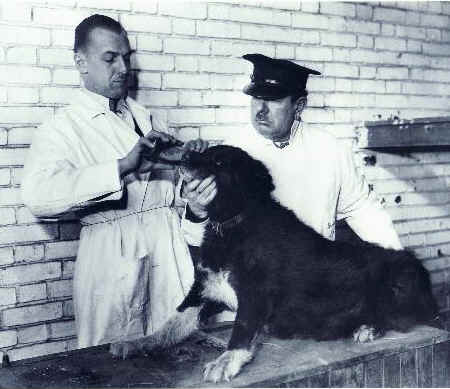
Photo courtesy of Special Collections,
Cleveland State University Library
|
Balto was preserved; his mount is on
display at the Cleveland Museum of Natural History. After the death of Balto, only
Sye was left. He died in 1934 at the age of seventeen. Sye was also preserved by a
taxidermy company in Cleveland. The fate of Sye's mount is unknown.
Gunnar Kaasen and his wife retired to Everett,
Washington in the early 1950's. He died of cancer on November 27, 1960, and is
buried next to his wife, Anna, at the Cypress Lawn Memorial Park cemetery in Everett.
SEPPALA TOUR
Leonhard Seppala and his sled dog team, led by Togo,
were major participants in the Serum Run, having traveled the longest distance of any
team. Seppala and his dogs also traveled from Alaska to the lower 48 states to do a
nationwide tour. They arrived at Seattle on November 2, 1926 aboard the Alaska
Steamship Company freighter, Tanana.
There were conflicting reports at the time as to the
number of dogs on board the Tanana. One account stated there were 52 Alaskan
Malamute dogs and 150 live reindeer. Twelve of the dogs were to be taken to
Hollywood, California, by Merle Lavoy, a motion picture photographer, and Arthur Keogh of
Nenana, Alaska, to appear in a film. The other 40 dogs were to participate in
various races in the eastern United States and Canada. The article further reports
that both Seppala and Lavoy accompanied the dogs during their journey from Alaska.
| In response to a request to take a picture of Togo,
Leonhard Seppala is quoted as saying, "He's getting old, and he's dirty and ragged
from the long trip. I'd like to brush him up before you take his picture." The decision was made to include another veteran dog of the Serum Run in that
photo -- the beautiful co-leader of the team, Fritz. |
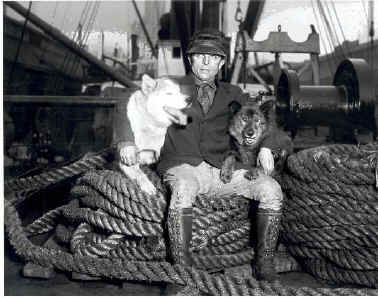
Leonhard Seppala with Fritz, left, and Togo
Photo courtesy of the Seattle
Post-Intelligencer Collection,
Museum of History & Industry, Seattle.
|
In addition to the news media, the Tanana was met
by a large party of "old-time Northerners" including Ralph Lomen and W. C.
McGuire. Lomen was from the Lomen Brothers Company in Nome and had provided some of
the reindeer on board the ship. McGuire was the former head of the Nome Kennel Club.
Another account of the arrival of the Seppala team,
which includes the photo taken aboard the Tanana, stated that Leonhard Seppala had 42 dogs
and three sleds with him. There was no mention of the reindeer, Merle Lavoy or
Arthur Keogh.
Upon his arrival at Seattle, Leonhard Seppala learned
that the agents who were going to pay his expenses for the nationwide tour had gone out of
business, according to reports at the time. He and his dogs were taken in by the
local Norwegian community. The dogs were put up in a horse barn.
SEPPALA TOUR: Side Trip to Bellingham
An agent approached Leonhard Seppala with an offer of
$1,500 if he would do an eight-day tour in Bellingham, Washington, one account says.
Seppala and a reported "twenty huskies" did in fact travel to Bellingham, a city
north of Seattle, for a one-week tour. They arrived by train on the evening of
November 5, 1926. The tour started the next morning. The local newspaper
reported that Leonhard Seppala had 20 dogs with him, but other news accounts
reported 22 dogs.
| Seppala and some of his Siberian sled dogs were
photographed in Bellingham's downtown area. The church
in the background was the Swedish Baptist Church on Champion Street.
This photograph was most likely taken November 9, 1926. |
|
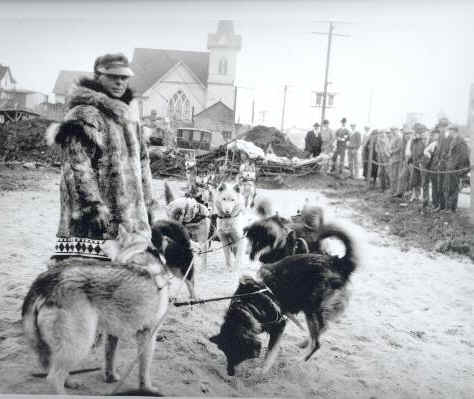
Photo courtesy of Whatcom Museum of
History & Art, Bellingham, Washington
|
[Note: The light colored
material covering the ground is sawdust and was spread on the vacant lot for the dogs. ]
Leonhard Seppala and his dogs received much attention
and admiration, and had a full schedule during their time in Bellingham, according
to the daily newspaper accounts. One stated in part: "Seppala's dogs were
admired and petted by scores of adults and children.... Togo, the leader, would not
permit strangers to pet him."
Seppala and his dogs were scheduled to be filmed by Fox
and Pathe News at the Heather Meadows area of Mt. Baker National Forest, which is located
just east of Bellingham. Everyone showed up at the location for the shoot and a
small amount of filming was actually done, but the event was canceled due to heavy rain.
The news agencies tentatively rescheduled the rest of the project for the following
spring.
AFTER THE SEPPALA TOUR
The famed musher and his dogs left Bellingham on
November 12. Kansas City was the next scheduled stop for the tour which eventually
took them to New York, New England and then on to a new chapter in the fame of Seppala's
sled dogs.
Neither Balto nor Togo would ever
return to Nome, but Fritz would -- more than 70 years after his death in New York City on
November 25, 1932.
To read the full story of the return of Fritz, the
Siberian Husky, influential in helping establish this breed of northern working dog, click here. |
|
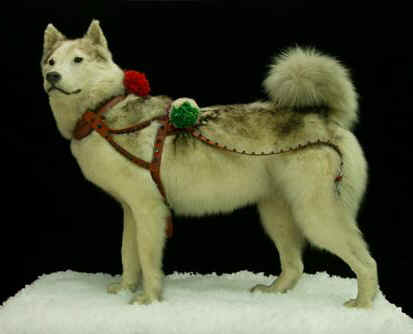
Photo courtesy of the Carrie M. McLain
Memorial Museum, Nome, Alaska
|
For Togo, arrangements had been made whereby he
would be donated to the Yale Peabody Museum upon his death. Togo was put to sleep on
December 5, 1929, by Dr. Carr W. Watson. The body of this famous dog was taken to
the Peabody Museum by Ralph Morrill, who later prepared his mount for display at the Dog
Hall of Fame. To read the full story of "Togo's Final Journey," also by Lance
Jensen, click
here.
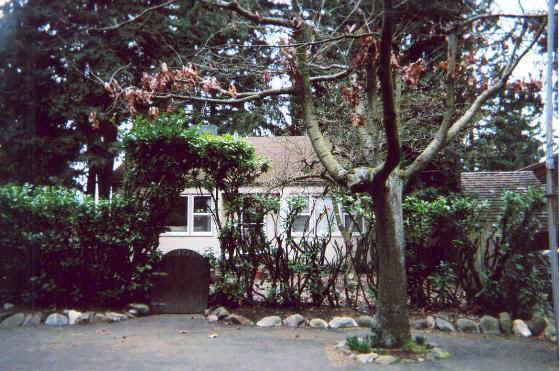 |
|
Years later, Leonhard and Constance Seppala retired to
Seattle, Washington. This photograph is of the house
where they lived from 1951 to 1955. Mr. Seppala passed away in Seattle on January
29, 1967.
[Photo courtesy of author] |
EPILOGUE
In addition to the vacant lot photo, above, I found
three other photos that were taken at Bellingham during the time period November 6 - 12,
1926. Two were of the Seppala dogs participating in a parade. It appears that
all of the dogs brought to Bellingham were in these two parade photos. A rope was
attached to the team and to the back of a car positioned in front of the team so that the
dogs would follow the designated parade routes.
I would like to thank Bob Thomas and Elsie Chadwick for
their assistance in identifying some of the dogs in the parade photos. Siberians with
definite identifications include Togo, Fritz and Matte. Possible identities of a
couple other dogs include one white male as either Nurmi, Frosty or Paddy and another dog
as Sugruk. One of the dogs at the rear of the vacant lot photo is possibly Chenuk.
The third photo featured Leonhard Seppala and
Togo. It was taken in connection with their participation in the Armistice Day
events and parade on November 11th.
I found three addresses for the Seppalas when they
retired to Seattle.
Two of the homes still exist. I also located and
photographed the gravesites of Gunnar and Anna Kaasen. Gunnar's is at right.
[Photo courtesy of author] |
|
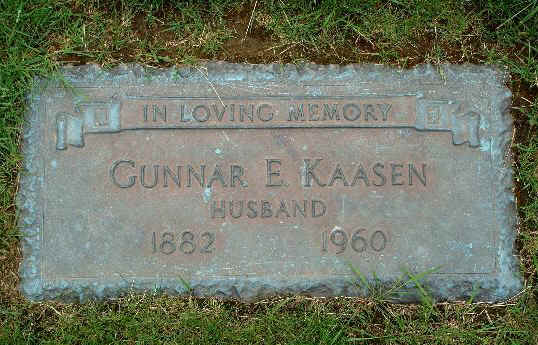 |
Sources: Author Lance Jensen
credits the following as his major sources about Balto's and Togo's experiences in the
Lower 48:
· The Seattle Daily Times
· Seattle Post-Intelligencer
· The Bellingham Herald
· Puget Sound Maritime Museum
· Everett Public Library
· Patricia Chargot
· Julie Muhlstein
· Carrie M. McLain Memorial Museum
· Cleveland Museum of Natural History
© Copyright 2008,
Lance Jensen
About the Author:
Lance Jensen is a Siberian Husky fancier who is
interested in learning and writing about the early history of the breed in the U.S.
He and his wife live in a rural farming area of Oregon with their Siberians and
Kuvasz. You can contact him via email at: sibekuv @ msn.com [remove the spaces].
WorkingDogWeb.com is grateful for the opportunity to publish his articles online.
Other resources:
· Sled Dogs Were
Lifesavers in the Serum Run
· The
Heroes were Huskies, on the Serum Run, New York Times
· Togo: entry in
Wikipedia
· Togo's Final Journey,
at WorkingDogWeb.com
· Balto and Togo: guide from
WorkingDogWeb.com
· Photo of
Togo at Iditarod Headquarters, Wasilla, Alaska, included
on this blog page
· Fritz,
another of Seppala's historic Siberian Husky, now displayed
at a Nome, Alaska, museum
· Leonhard
Seppala, a brief biography of the famous Alaska musher
from Norway, and a longer Leonhard Seppala biography
· Headquarters
of the Iditarod Trail Sled Dog Race, Wasilla
· Shelburne
Museum, Shelburne, Vermont
· Siberian Husky World Online, guide
from WorkingDogWeb.com
.